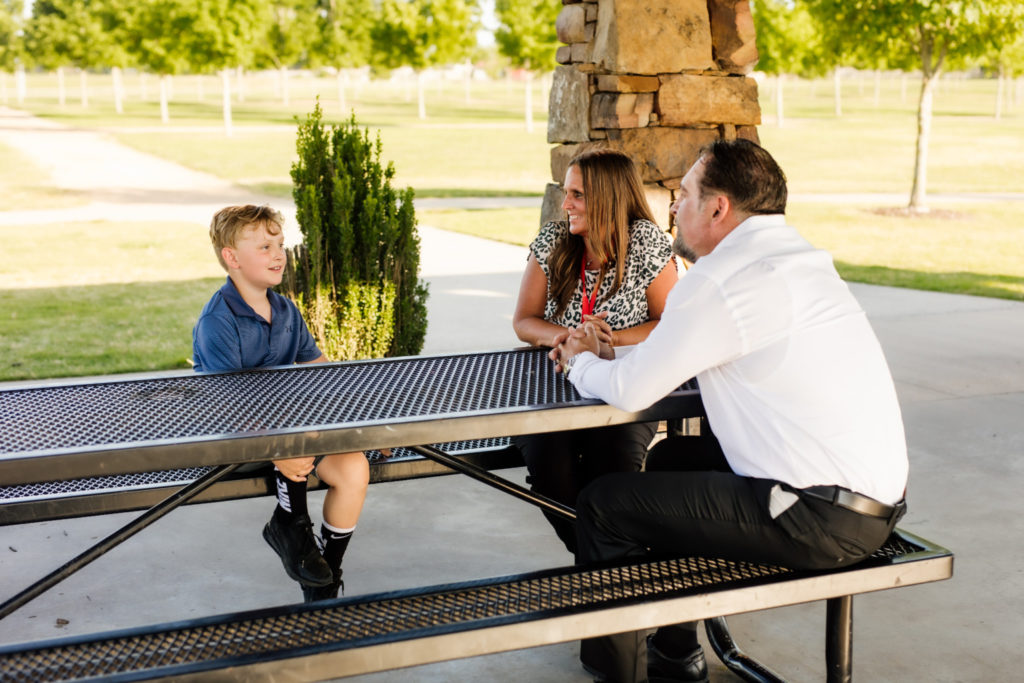
This months blog post comes from Sadie Perkins, one of our two Advocate Supervisors that are trained as TBRI (Trust-Based Relational Intervention) Practitioners. We believe serving the best interests of children in care begins with having qualified and knowledgeable child welfare experts to guide our CASA Volunteers in their cases, which is why CASA of NWA invests in specialized training for our supervisors.
Trauma-Informed Advocacy
At CASA of Northwest Arkansas, we recognize that every child we work with has been impacted by trauma, which is why we seek to be trauma-informed advocates. But what does it really mean to be trauma-informed? And how should that guide how we interact with and advocate for the children on our cases?
Trauma, very simply, can be described as a person’s emotional response to a distressing experience. All children in foster care have experienced at least one kind of trauma, in the very act of: being removed from their family. But realistically, the children we work with have likely experienced many traumas, often over long periods of time. For children in foster care, trauma is woven into the very fabric of their upbringing, and this impacts their cognitive, emotional, social, and physical development. In many cases, these traumas happen in the context of relationships, which can be particularly damaging to a child’s ability to grow and develop. At CASA of NWA, however we find hope in the fact that while trauma occurs in the family, healing can follow with the building of strong, positive relationships. And a trauma-informed CASA can be a meaningful part of that healing journey.
The Karyn Purvis Institute of Child Development provides us with three reminders as we seek to work with children in a way that is trauma informed.
Stay Calm (No Matter What) Children who have experienced trauma often exhibit challenging behaviors and responses as a result. When faced with these responses from a child, our first goal is to remain calm, especially when the child is not calm. These behavioral can be very big and loud, may be inappropriate, can be illogical and even offensive. But a child in crisis cannot be calmed by an adult who is also in crisis. The ability to stay calm in the face of chaos requires us to be mindful of our own internal state and to care for ourselves before and after these difficult interactions. Being the calm in the storm of a child’s trauma response can build trust and connection that can help a child begin to heal.
See The Need (Behind the Behavior) When we begin to learn about how trauma affects the development of a child, we can begin to shift our perspective from “This child is behaving badly” to “This child is trying to communicate something”. This shift in perspective can transform how we interact with and advocate for children. When we move our focus from “why are they misbehaving?” to “what does this child need right now?” we also begin to move from a pattern of punishing the child for making “bad” choices to a pattern of seeking ways to connect and help meet their needs, which ultimately leads to greater trust and healing.
Meet the Need (Find a Way) When we begin to develop the mindset that all behavior is an expression of a need, we can better advocate for our CASA kids. If we can see the need behind the behavior, we can seek opportunities for those needs to be consistently met in a way that makes sense to the individual child. And a child who believes they are safe, that they are heard, and that they matter is a child who can begin to thrive. This pattern of consistently seeing and meeting the needs of the child builds trust in the relationship, and it allows children to begin to develop new, and more appropriate coping, social, and communication skills.
Trauma informed advocacy does not allow for a generalized approach to working with children. It requires us to approach each child as an individual, with a trauma background that we will never fully know. It requires us to interact with and advocate for each child uniquely, as we take the time to learn who they are and what makes sense to them. It requires us to educate ourselves about the impacts of trauma and best practices for working with children who have experienced trauma. And finally, it allows us the privilege to sow seeds of hope and healing through consistent, safe, and meaningful connections.
Interested in becoming a Court Appointed Special Advocate?
Click here to see what it takes!